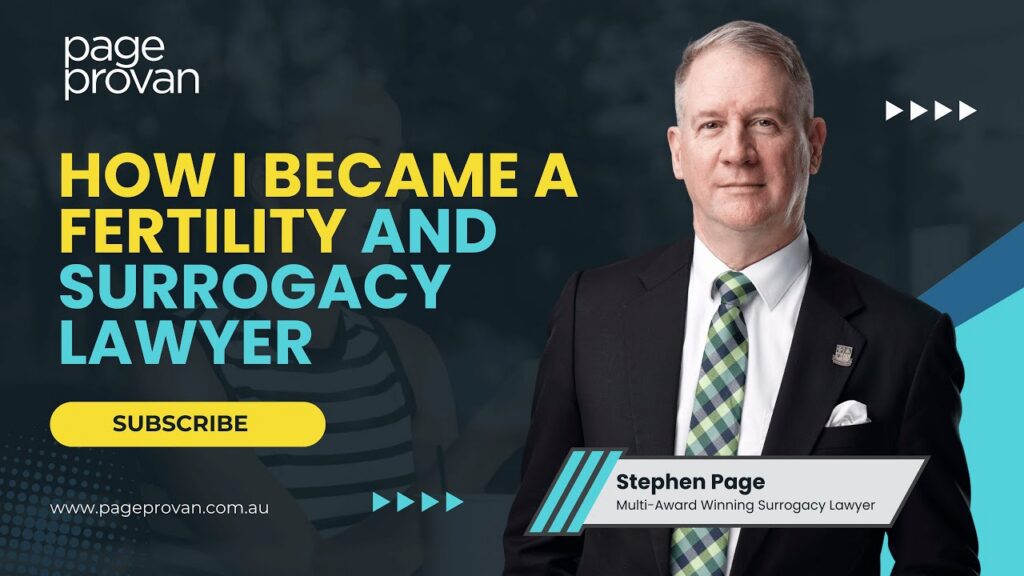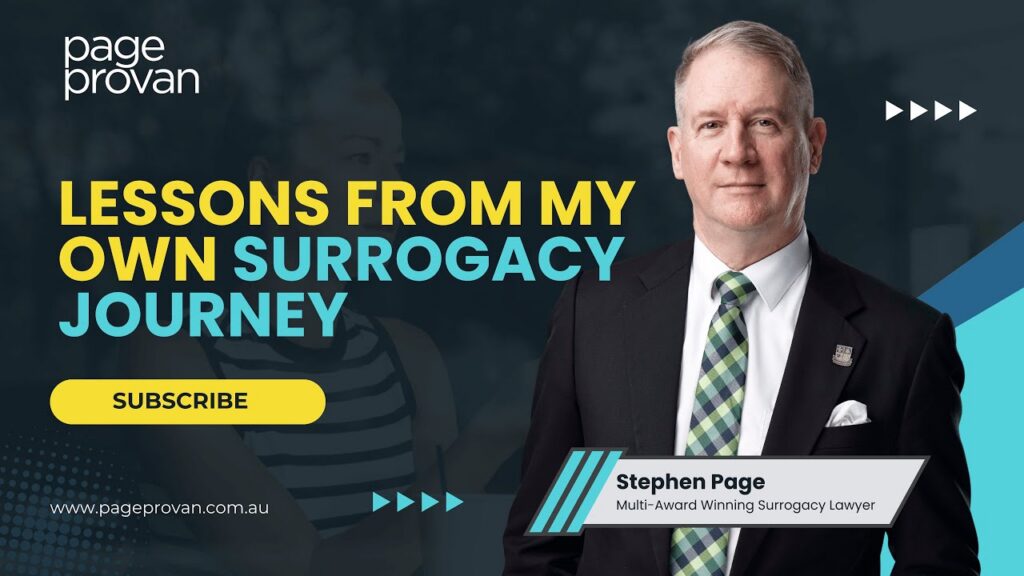What Does an Independent Children’s Lawyer Do?
In this video, Accredited Family Law Specialist and Page Provan Director, Stephen Page, discuss the role of an Independent Children’s Lawyer.
Transcript
G’day, I’m Stephen Page from Page Provan Family and Fertility Lawyers. I’m talking today about the role of an independent children’s lawyer. An independent children’s lawyer is someone appointed by the Federal Circuit and Family Court of Australia in parenting proceedings.
The court has to be satisfied first that there is a need for an appointment. The court then makes an order and then sends that order to a legal aid body and in my case, Legal Aid Queensland, where it then sends a referral out, a request to someone who’s on the panel to see whether they’re prepared to act, and I’m on the panel of Legal Aid Queensland independent children’s lawyers and I’ve been on that panel since, from recollection, about 2008.
So quite a while. Now, it took me a while to choose to be an independent children’s lawyer, I’ve been practicing as a family lawyer for about 20 years prior to that. Certainly, one of the things about an independent children’s lawyer, in Queensland at least, is that they don’t make money out of the job. The amount that we get paid has been largely set in stone for the best part of 30 years. It hasn’t gone up very much at all.
I’m an independent children’s lawyer because I want to help children, and when I talk to other independent children’s lawyers, that’s what they want to do as well. So what’s our role? Our role ultimately is to help the court, and that is to assist the court in making the right decision as to what is in the best interests of this particular child or children, and the point of being appointed is to gather in the evidence, see what’s there, shine a light on the case, and then to assist and we assist in a number of ways.
The obvious one is at the end, at a trial where a barrister on my behalf will stand up and set out my position to the court to articulate what I consider is in the best interests of the child. In putting that position, I’m not bound by what the child’s wishes are.
Indeed, sometimes I’ve told the court, this is in the best interests of the child, even though the child’s wishes are contrary. But I am bound to put the child’s wishes before the court. The court needs to know. The whole court case is about this child or these children, and therefore, the court needs to know what this child wants.
Whether or not that’s in the best interest of the child is another matter, but at least the court is aware of what the child wants. Part of the role of an independent children’s lawyer is to act as an honest broker. Only about 5 % of parenting matters end up at a trial, that’s a good thing.
If it’s possible for the parents to cut a deal and work out what’s in the best interest of their child, that’s a better outcome than having a judge impose an outcome. Therefore, I’m involved in negotiating matters. I’m also involved in any family dispute resolution that may occur after my appointment that might occur, for example, through Legal Aid Queensland or through the court and I’ll set out my views to the parties.
Now, they may accept my views or they may reject them. But of course, I’m coming in as someone independent who is just focused on that child and that child’s best interests. The judges have said over many years that there’s great benefit in having an independent children’s lawyer by acting as that honest broker, because it helps reduce the dispute between the parents. So it’s not as inflamed, and therefore, hopefully, they can move forward and have arrangements for their children outside the court environment.
Because as long as the matter is before the court, it’s as long as it’s inflamed and so far as the adults are concerned, well, they can cope with it, although it’s highly stressful, the poor kids in the centre of the dispute, of course, they’re the meat and sandwich. So the sooner we can get them out of the court environment, the better.
That role of gathering in the evidence involves a couple of things that I would typically do, every case is different and it will depend on what the needs of that case are. But in most cases, I will issue subpoenas, which are a short form of court order compelling someone to typically produce documents, and that might be to police, or child safety, or doctors, or schools amongst others, to produce documents that can then shine a light on what’s happened with this family in the past and what risks there are.
The second thing that I will typically do is engage a family report writer. This is either a social worker or psychologist who carries out an independent assessment of this family and in particular makes recommendations about what is in the best interests of this child or these children.
Family report writers are not gods, neither are independent children’s lawyers. We’re just trying to do the best thing that we can based on the evidence before us. If I obtain a family report, I’m not bound by that report, and neither is the court.
It’s just part of the matrix of the evidence that has to be weighed up and assessed and then considered as to what is in the best interest of the child. But nevertheless, obtaining a family report is a very important step, and it’s one that I take very seriously.
It’s usually of great assistance to me in the discharge of my job, and to the court in the discharge of its job, in assessing what is in the best interest of the child, to then ensure that there are arrangements in place that assist that child. Being an independent children’s lawyer is a great responsibility. It’s one that I enjoy because I want to help children.
There is often a desire in New South Wales, in particular, for an independent children’s lawyer to meet the child and sometimes to interview the child. The practice in Queensland is less to interview the child, we rely on family report writers to do so.
However, it’s my common practice to meet the child. I want to know who this child is, even if I’ve only met them briefly. It’s much better than reading in a piece of black and white paper in an affidavit who this person is, and I think this was really driven home to me many, many years ago in a case where I was not an independent children’s lawyer, but I was acting for mom.
In that case, I was acting for an African woman who was originally from Kenya, and she was a very tall woman, best part of two metres tall. I wasn’t her first lawyer, I was her second or third, and she had a fight, a bitter fight with her ex, who was an Australian, a white Australian man. From recollection, he was slightly shorter than she was.
Their children were girls and they were teenagers. Somehow, in all the drama that had happened between them, between the parents, I should say, in the breakdown of the relationship, the girls were estranged from their father, and they identified very strongly with their mother. One day, the penny dropped for me part of the reason as to why that was the case.
They happened to come to my office. It wasn’t something that I’d planned, it was just one of those things that happened. I think they were going shopping in the city, and they just happened to be there. These girls looked like their mother. They were cookie cutter images of their mother, they were close to 6 foot tall, and clearly African.
So when they looked in the mirror, they identified with their mother and did not identify with their father, really as simple as that. So as I said, I like to meet the children, I like to see the case and understand what the case is about, and I work it up because that’s my job.
An independent children’s lawyer is a vital part of the process, and most of the time they assist in resolving the matter and moving the matter forward so that the court and the parties know what is in the best interest of the child.
Thank you.












